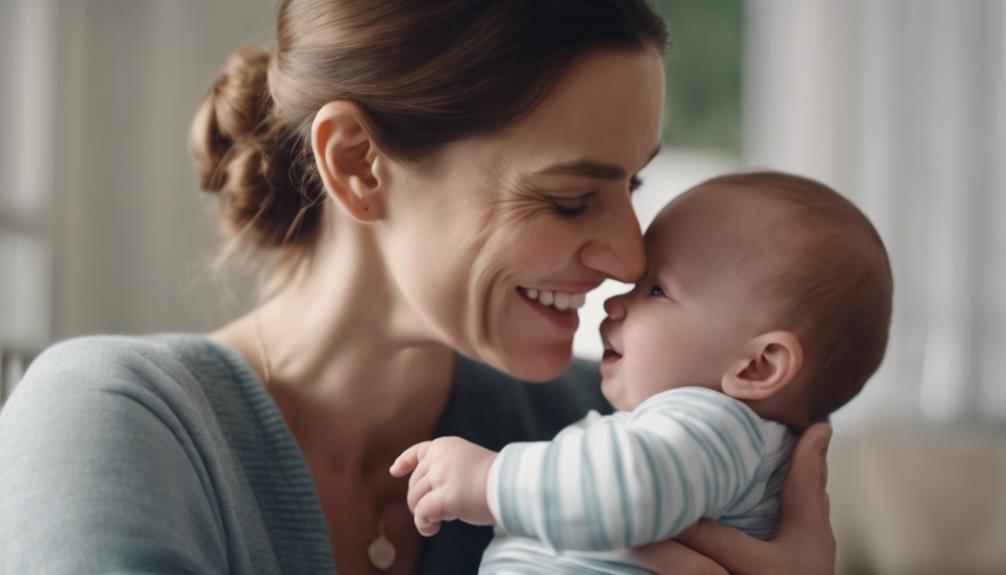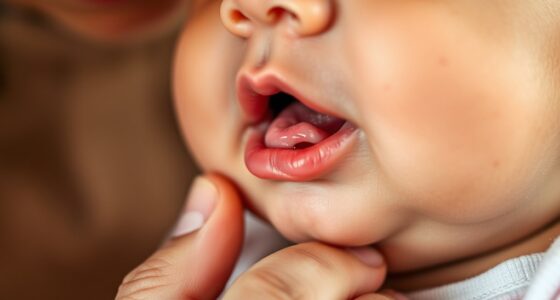To determine whether a baby has a liking for you, pay attention to the signs of bonding and connection they exhibit. Take note of the eye contact they make while feeding, their preference for your touch, and the happiness they show when they are around you. If they imitate your facial expressions, track your gaze, or reach out to be held, these are positive signs. Look out for smiles or coos when you speak to them and their excitement when you return. Babies often express their feelings through eye contact, seeking comfort, and showing joy. By observing these subtle cues, you can strengthen your bond with the baby and gain a better understanding of their affection.
Key Takeaways
- Mimicking facial expressions shows connection and liking.
- Seeking solace in your touch signifies trust.
- Excitement upon your return displays affection.
- Meeting your gaze reflects emotional connection.
- Communication and interaction strengthen the bond.
Eye Contact During Feeding
During feeding, notice how the baby engages in eye contact to show trust and connection with you. This eye contact isn't just a random gaze; it's a powerful way for your little one to communicate their feelings of comfort and security.
By locking eyes with you, your baby is strengthening the bond between you two, creating a special moment of shared understanding and love.
When your baby looks at you during feeding, it's a sign that they feel safe and connected to you. This simple act of meeting your gaze can speak volumes about the emotional connection between caregiver and child.
Preference for Your Touch

When a baby displays a preference for your touch, it signifies a strong connection and liking towards you. If the baby reaches out to be held by you or calms down when in your arms, it shows trust and comfort in your presence.
Babies often seek solace in familiar arms, so if they appear distressed when held by others, it reinforces their preference for your touch. Their reliance on you for comfort and the ability to soothe them indicate a deep level of liking and attachment.
Additionally, observing a baby's behavior when you're away can also reveal their preference for your touch. If they exhibit separation anxiety or seek you out when upset, it highlights the bond they feel towards you. Furthermore, the ability of a baby to sleep better when you're close by demonstrates the comfort and security they associate with your touch, emphasizing their fondness for you.
Trust in your touch is a powerful sign of the baby's affection and connection with you.
Excitement Upon Your Return

When a baby enthusiastically reacts to your return, their happiness shines through their joyful expressions. They may smile, kick their feet, or reach out to you, all signs of their excitement to see you.
Observing these reactions can give you valuable insights into the bond you share with the baby.
Happy Baby Reactions
Upon your return, gauge a baby's liking towards you by observing their happy reactions, such as smiles, laughter, and excited sounds. When a baby sees you and their face lights up with a big, toothless grin, it's a clear sign of their affection. Those adorable baby smiles are like little beacons of joy, letting you know that they're happy to see you.
Additionally, if the baby gets enthusiastic, perhaps kicking their legs or waving their arms enthusiastically, it's a sure indicator of their fondness for you. These happy baby reactions speak volumes about the bond you share. Look for signs like the baby reaching out for you or showing genuine excitement when you enter the room.
Their body language can also reveal their feelings, like leaning towards you or eagerly looking your way. Pay close attention to how the baby responds to your presence; their sheer excitement and joy are undeniable signs of their affection towards you.
Joyful Responses Evident
Notice the baby's joyful responses evident in their excitement upon your return, showcasing their affection and liking towards you. When a baby truly likes you, their happiness knows no bounds, and you can see it through their actions:
- Smiling: A genuine smile from a baby is a sure sign of their joy and liking towards you.
- Cooing: The sweet sounds of a baby cooing in delight as you interact with them is a clear indicator of their happiness.
- Reaching out for you: When a baby reaches out to be held or touched by you enthusiastically, it shows their fondness towards your presence.
- Giggling: The infectious giggles of a baby when you play or interact with them exhibit their excitement and happiness.
- Clapping or kicking their legs: Watch for the adorable gestures of clapping or kicking their little legs in excitement, demonstrating their joy in being around you.
These joyful expressions are the baby's way of communicating their affection and attachment towards you.
Mimicking Facial Expressions

When a baby mimics your facial expressions, it's a clear sign that they're trying to connect with you.
By copying your smiles or frowns, they're showing interest and engagement in interacting with you.
This mirroring behavior helps them understand emotions and build a strong bond with you.
Facial Expression Mirroring
Babies naturally mimic facial expressions in order to build connections and communicate effectively with you. When a baby mirrors your smiles or frowns, it's a subtle yet powerful way of showing engagement and forming a bond with you.
Here are some key points to keep in mind regarding facial expression mirroring:
- Mirroring your expressions is a sign of bonding and connection.
- It indicates that the baby is actively trying to understand and communicate with you.
- Pay attention to how the baby mimics your facial expressions to gauge their comfort and liking towards you.
- This mirroring process helps babies grasp emotions and social cues from a young age.
- Engage in interactive facial expressions to encourage the baby's social development and strengthen your bond.
Copying Your Smiles
Mimicking facial expressions, such as smiling, is a fundamental way for babies to learn and connect with caregivers. When you smile at a baby and they mirror your joyful expression, it's a heartwarming sign of their affection and emotional development.
Babies imitate actions of love, like smiling, as they learn to show closeness and bond with those around them. So, if you notice a baby copying your smiles, it's a clear indicator that they feel connected to you and are trying to communicate their happiness.
Moreover, babies might even imitate kissing gestures, showcasing their ability to pick up on expressions of love and warmth. This behavior not only demonstrates their growing social skills but also highlights their desire to reciprocate feelings of affection.
Following Your Gaze

By maintaining eye contact and following your gaze, a baby demonstrates their interest and connection with you. It's a beautiful way for them to show that they're engaged and attached to you.
Here are some subtle signs to look for:
- Imitating Your Expressions: Babies who like you may try to mimic your eye movements or expressions, indicating a sense of connection and understanding.
- Paying Attention to Your Focus: When a baby follows your gaze, it shows they're intrigued by what's captured your attention, demonstrating their interest in you.
- Tracking Your Movements: If a baby consistently tracks your movements with their eyes, it's a sign that they're trying to stay connected with you visually.
- Maintaining Eye Contact: Babies who like you'll make an effort to maintain eye contact, showing their desire to engage with you on a deeper level.
- Expressing Attachment: The ability to follow your gaze not only indicates interest but also signifies the baby's emotional attachment to you, fostering a strong bond between the two of you.
Seeking Comfort When Upset

When a baby seeks comfort from you when upset, it is a clear indication of their trust and affection towards you. It shows that they feel safe and loved in your presence. Babies often seek closeness and reassurance from those they trust when they are distressed. This seeking of comfort is a beautiful display of the bond they are forming with you.
| Signs of Seeking Comfort When Upset | Description | Importance |
|---|---|---|
| Preferring to be held by you | Indicates trust | Shows attachment |
| Calming down when you hold them | Shows comfort | Demonstrates trust |
| Seeking physical closeness when upset | Sign of affection | Reflects love |
When a baby displays these behaviors, it's important to respond with care and understanding. Comforting them during these moments not only helps them feel secure but also strengthens the bond between you. Your responsiveness to their needs builds a foundation of trust and love that will benefit them throughout their development.
Smiling or Cooing When Talked To

When a baby smiles or coos in response to your voice, it's a positive indicator of their enjoyment in interacting with you. These subtle cues are early forms of communication that show a baby's positive response to your presence.
Here are some signs to look out for when a baby is smiling or cooing in your direction:
- Eye Contact: If a baby maintains eye contact while smiling or cooing, it shows they're engaged with you.
- Mirroring: Babies might try to mimic your facial expressions when they smile or coo, indicating a connection.
- Excitement: Increased movements or kicking paired with smiling or cooing can signal their joy in your company.
- Relaxed Body Language: A baby with relaxed body language while smiling or cooing is likely comfortable around you.
- Repetition: If a baby consistently smiles or coos when you speak to them, it shows a pattern of positive interaction.
Next, let's explore how babies express their desire for physical closeness by 'Reaching Out to Be Held'.
Reaching Out to Be Held

To gauge a baby's fondness towards you, observe if they reach out for you to be held. When a baby extends their tiny arms towards you, it's a heartwarming sign of trust and affection. This simple gesture speaks volumes about the bond you share with the little one.
By reaching out to be held, the baby is expressing their need for closeness, comfort, and security that only you can provide. It shows that they rely on you for emotional support, creating a strong attachment that's built on trust.
Encouraging this behavior can deepen your connection with the baby, fostering a sense of security and love. Being responsive when they reach out to be held helps them feel understood and cared for. Paying attention to these subtle cues can help you better understand the baby's needs and strengthen the beautiful relationship you have with them.
Displaying Joy Around You

How can you tell if a baby is displaying joy around you?
When a baby is happy and content in your presence, they often exhibit subtle yet heartwarming signs of joy that can melt your heart. Here are some ways to recognize these lovely gestures:
- Smiling: A baby's smile is a universal sign of happiness and liking you. If they light up with a big grin when they see you, it's a clear indication of their joy.
- Body Language: Watch out for their body language cues. Excitement can be displayed through kicking their legs, waving their arms, or even bouncing up and down with glee.
- Eye Contact: Their eyes can tell you a lot. If a baby's eyes sparkle and they focus intently on you, it shows that they're delighted to be around you.
- Physical Affection: Reaching out to be held, wanting to snuggle close, or seeking comfort in your arms are all physical ways babies express their joy towards you.
- Increased Responsiveness: When a baby's mood visibly improves in your presence, and they become more engaged and responsive, it's a sure sign that they enjoy being with you.
Frequently Asked Questions
How Can You Tell if Your Baby Likes You?
You can tell if your baby likes you by observing their reactions. If they show excitement or seek comfort from you, it's a good sign. Look for signs of attachment and trust, like calming down when you hold them.
How Do I Know if My Baby Is Attached to Me?
You'll feel it in the way they snuggle close, seek your touch, and light up with joy at your presence. When they cry for you, smile at you, and find comfort in your arms, your baby is attached to you.
How Do You Know if Your Baby Is Looking at You?
To know if your baby is looking at you, watch for direct eye contact, tracking your movements, and smiling in response to you. When they reach out or show a preference for your presence, it's clear they like you.
Can Babies Sense When You Don't Like Them?
Babies can sense your emotions deeply. When you show dislike, they may respond with distress or disinterest. Positive interactions build trust and love. Remember, your care and affection shape their world.
Conclusion
To sum up, if a baby likes you, they'll show subtle signs through their actions and reactions. Pay attention to their eye contact, touch, and expressions to gauge their feelings towards you.
Remember, building a bond with a baby takes time and effort, so be patient and nurturing. Keep an eye out for these signs and enjoy the special connection you share with the little one, even if they can't tell you in words.









